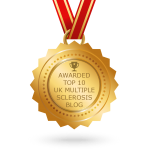Diagnosis, what next?
You have been diagnosed with Relapsing Remitting Multiple Sclerosis (RRMS), this happened to me in 1995. How many of you have been offered a disease modifying therapy (DMT) and when were you diagnosed?

You try disguising a fall
When I was diagnosed with MS I was not offered any treatment because none was available. I was lucky, the MS was not aggressive and I survived the next 17 years in a permanent state of denial. Everything did eventually catch up with me and I retired in Jan 2012. I no longer had the stamina to travel to Europe every week and do 5 full days of work. I had advanced SPMS and I could not hide the problems any longer. Fatigue and falling over were my downfall.
The ASCEND trial
A few months after stopping work, because of the MS, I was accepted for the ASCEND trial. Biogen Idec are testing Tysabri to see if it can reduce progression for people who have SPMS. I’m JC positive so there is a small chance that I will get PML, very bad news. If I did not go on the trial I would definitely carry on getting worse. Anyway there is a 50/50 chance that I will be on placebo. At the end of the trial I get the opportunity to receive Tysabri courtesy of Biogen Idec. The choice was a ‘no-brainer’.
OK, a number of other drugs are being investigated, see the trials MS-SMART & EXPAND. I am sure that it will be several years before these drugs go onto the next stage of the trial or even come to market. So what have I got to lose?
Diagnosis & post code lottery
It is very difficult for people just diagnosed to know what to do. They have no idea how the disease will progress. The chances are that even if the risks of disease progression can be understood. there is the dilemma of which drug could help and its side effects. The chances are that you are in your 20’s or 30’s, thinking about a family, promotion at work and buying a house. Now add the problems of an MS diagnosis and a postcode lottery to the mix. Don’t you think it now sounds a bit like Russian roulette?
Which drug?
The drug that seems to be relatively risk free and has a good track record is Campath or alemtuzumab. Rebif /Copaxone are based on Beta Inteferon and are probably the least effective of the drugs available but they offer very little risk. Tysabri is the most successful but there is potentially a high risk that goes with it. Every treatment has its good points and its bad points. Remember these drugs are not a cure, just a chance to slow down progression.
The consultant
There is another potential problem and that is your consultant. I did not like the consultant who diagnosed me and I suspect the feeling was mutual. I have since found out that he knows a lot about MS. Not every neurology consultant is going to be fully conversant with MS and I’m darn sure there are areas of the UK where medical knowledge and support is patchy.
Sticky side up
I am lucky, I now have a very good consultant. My MS is not very aggressive but its not very friendly either. I’m 58 and the disease had no obvious effects upon me until 10 years ago. On the other hand now in 2013 I can no longer work, I cannot drive and I find walking very difficult but I can run this website. Sometimes the toast does land sticky side up.
Remember your MS clock is ticking all the time
Today I do not envy people who are diagnosed with MS. There is almost never a simple answer to the questions that are bound to be asked after a diagnosis. In this article I am trying to get you to investigate the questions you should be thinking about – what therapy is available? At the end of the day you need to talk to a person who has knowledge of your situation and knows what is available for you. Below there are some references to follow up on the internet, they could help you.
Do these help?
Multiple Sclerosis Research Blog Answers all your questions but can be a bit academic
MS Society The work and research funded by the MS Society
MS Trust A source of information, education, research and support



Leave a Reply